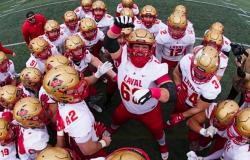The walls of the Montreal Canadiens home are shaking.
The coach of the Laval Rocket, Pascal Vincent, is increasingly establishing himself as an essential figure, and his name is on everyone’s lips when the future of Martin St-Louis is mentioned.
In a recent interview with the podcast Hockey Wife, Vincent hinted at his ultimate dream: winning the Stanley Cup, in Montreal.
This simple admission resonated like a rallying cry for those who believe that the CH deserves better than life lessons and thinly veiled tactical improvisation.
When asked which he would favor between an Olympic gold medal and a Stanley Cup, Vincent hesitated before answering frankly: “The Stanley Cup… in Montreal. »
This choice was not trivial. He betrays a clear ambition and a desire to take the reins of a team that he already sees as his destiny.
If some see it as a simple patriotic declaration, others read a subtle message: he is ready.
Unlike Martin St-Louis, Vincent went to school. From the QMJHL to the NHL, via the AHL, he climbed the ranks one by one.
He experienced the terrain, the struggles, the failures and the victories that forge a true coach. St. Louis, for its part, went straight from the bantam to the NHL, a trajectory that, while it was applauded for its bravery at the start, is starting to look like a casting mistake.
Criticism of St. Louis continues to pile up. His simplistic approach, his often chaotic player management and his inability to impose a solid defensive structure make him an easy target.
Meanwhile, Pascal Vincent is seen as the anti-St. Louis: methodical, disciplined and anchored in proven systems.
Where St-Louis preaches patience without delivering tangible results, Vincent inspires rigor and respect.
Under Vincent’s leadership, the Laval Rocket is having an exceptional season, with a 13-3-1 record. Conversely, the Montreal Canadiens continue to be mired in mediocrity, oscillating between encouraging performances and public humiliations.
The contrast is stark, and fans are starting to wonder why a rebuilding organization doesn’t bring in a coach who knows how to win.
Beyond the performances, a question burns on the lips: is Kent Hughes sacrificing Martin St-Louis?
By refusing to bolster the team with judicious acquisitions, whether on waivers or on the trade market, Hughes is sending a clear message: the future comes before the present.
But at what cost? St-Louis, already under pressure, finds itself isolated, without the tools necessary to succeed.
Hughes, with his questionable trades — Barron for Lehkonen, Newhook for a first and second round pick — and his refusal to budge on the trade market, appears to be setting the stage for an inevitable dismissal from St. Louis.
Why give him a contract of 5 million per year until 2027 if not to make him the perfect scapegoat when the tide turns?
In this context, Vincent appears to be a logical and attractive solution. Originally from Laval, he embodies the Quebec values of effort and discipline.
He knows the ropes of the NHL and has proven that he can get the best out of his players. His success with the Rocket has not gone unnoticed, and his profile corresponds to what the CH are desperately looking for: a coach capable of developing young people while imposing a solid structure.
Pascal Vincent’s dream of winning the Stanley Cup in Montreal is not just a simple aspiration. It’s a challenge he’s ready to take on, and the pressure on Kent Hughes to consider a change behind the bench will only increase.
Meanwhile, Martin St-Louis, abandoned by his general director and criticized from all sides, sinks a little deeper every day into an untenable situation.
If the Canadian really wants to become a respected team again, they will have to make courageous decisions. And replacing St-Louis with Vincent could well be the first step towards a more promising future.
The time for excuses is over. The time has come for a real revolution behind the bench.
If Pascal Vincent was not careful in his public declarations during this podcast, his interview with Rodger Brulotte, published in Le Journal de Montréal, looks even more like a real letter of application for the position of head coach of the Montreal Canadiens.
Brulotte, with his incisive style, rolled out the red carpet for Vincent, giving the Rocket coach a platform to expound on his philosophy, his ambitions and, above all, his desire to lead an NHL team.
In this interview, Brulotte does not just ask questions; he paints a flattering portrait of Vincent, presenting him as a natural candidate to succeed Martin St-Louis.
“You studied hockey. You know what it takes to win. Are you ready to take on a challenge of this magnitude? » Brulotte asks insistently, placing Vincent in a position where his answers resonate as a promise for the future.
Vincent, without ever directly attacking St-Louis, suggests that he is the man for the job.
“My journey has taught me that nothing is left to chance in this league. You must have a plan, structure and the discipline to execute it. I believe that players want a clear framework, where they can express themselves while knowing that they have responsibilities. »
Through this interview, Vincent does not spare the faults which, according to him, slow down the progress of a team in reconstruction like the Canadian.
Without ever naming Martin St-Louis, his comments on the need for a “clear framework” and “tactical discipline” sound like a disguised criticism of the more instinctive and improvised approach of the current CH coach.
Brulotte, who seems to have taken Vincent’s side, reinforces this impression by recalling the successes of the Laval coach. He particularly highlights his beginnings in the QMJHL, where he was named general manager and coach of the year, his successful stint in the AHL, and even his experience in the NHL with the Blue Jackets.
“You have proven that you can adapt at all levels. It’s rare in today’s hockey.”notes Brulotte, suggesting that Vincent has a background that St-Louis cannot match.
Pascal Vincent does not stop at this single interview. He increases his appearances in different media, using each platform to reinforce his image as a serious candidate ready to take the next step.
This well-calculated strategy places Vincent at the heart of discussions surrounding the Canadian’s future. Each intervention, each interview, seems intended to remind us that he is not only available, but also the logical choice to bring a certain rigor behind the Montreal bench.
In his interview with Brulotte, Vincent also develops his vision of modern hockey.
“Today’s players want to know why they are doing what they are asked to do. You must be a communicator, but also an educator. Each player must understand their role and how it fits into the overall system. »
This approach contrasts with the criticism often leveled at Martin St-Louis, accused of relying on individual talents without offering a structured framework.
“I think a good coach must adapt to his players while remaining faithful to his principles. Tactical flexibility is essential, but it must be based on solid foundations. »
With his repeated media outings, Pascal Vincent sends a clear message: he is ready to take on the challenge of leading the Montreal Canadiens.
While Martin St-Louis continues to face criticism of his management and his results, Vincent skillfully positions himself as a credible, even necessary, alternative.
The interview with Rodger Brulotte, as well as his interventions in other media, shows a man determined to take his place.
And if the tide turns for the Canadian, Pascal Vincent could well be the one who will embody the next phase in the team’s history.
The Journal de Montréal and its collaborators seem to have chosen their camp. Their support for Vincent, subtle but constant, only adds to the pressure on Martin St-Louis and Kent Hughes.
If results do not follow quickly, it is increasingly likely that Vincent will become the face of a new beginning for the Habs.
What if he was the one to bring the Stanley Cup back to Montreal?





